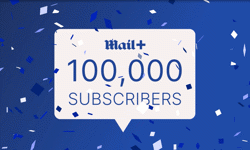It is difficult to imagine a more unusual cheerleader for the British newspaper industry than Freddie Ossberg, a Swede who wanted to become a strategy consultant but who instead slipped accidently into publishing.
Freddie is from Malmo, the Swedish end of the 8 kilometre bridge link with Denmark made notorious in the recent crime thriller series The Bridge on BBC4 where death was bloody and frequent.
Freddie Ossberg loved the fiction but in the real world he is one of those arguing vociferously that the death of the newspaper industry has been much exaggerated.
Operating margins up!
The 31-year-old, who is a fan of newspapers and is founder and managing director of Raconteur Media, goes further and argues that despite the obvious challenges, the operating finances of the industry are in reasonable shape.
Ossberg unveiled some telling numbers at the recent MediaTel seminar on the future of the national newspaper industry, which highlighted why there has been such a problem in terms of collapsing share prices – and possible routes to greater prosperity.
The Swedish executive looked at the write-downs – essentially the result of poorly judged and over-priced acquisitions - of a number of major media companies in 2008 and 2009.
In those years, CBS of the US, News Corp and Time Warner had write-offs totalling $48 billion!
At the same time, three technology companies Cisco, Microsoft and Oracle wrote off a total of $795 million in assets.
Ossberg acknowledges that the comparisons are crude but that the huge disparity is “too significant to not be conclusive”.
Closer to the UK, he could have looked at the effects of the Johnston Press acquisitions at the top of the market and the hit on the company’s profits and share price.
The difference helps the Swedish executive towards the suggestion that the downturn in recent years has been “more cyclical than structural”. This possibility was further reinforced by research that Ossberg did in preparation for his opening speech at MediaTel.
“I found that operating margins for media companies have actually steadily increased since the dawn of the internet age. They seem to be getting better at what they do, not worse. Given what we generally hear reported, this seems almost incredible, but it’s true,” insists Ossberg whose company Raconteur produces special sections and supplements for papers ranging from the Times and Sunday Times to the Washington Post and the Huffington Post.
“The clients I like to work for cater for intelligent people, people who are interested in the world and in issues such as what is going to happen to population and its impact on climate change or sustainable agriculture,” said Ossberg in an interview.
The Raconteur managing director accepts that the circulation of paper editions may drop further but that newspaper business models adapted for online and tablets such as iPads should be able to sustain “quality journalism” for the foreseeable future.
His primary argument – which is partly talking up his own book and the services his company provides – is that newspaper groups much search for new multiple streams of revenue and make more use of partnerships.
Tablets, he believes, offers enormous hope for the future of newspaper publishers.
The tablet opportunity
“The opportunity is that tablets will allow them (publishers) to seamlessly integrate text, video and interactive graphics and not only create more engaging content but on the video side gain access to big TV budgets,” argues Ossberg.
Whether publishers will actually be able to access TV budgets may be a matter for debate but what is clear is that tablets are rapidly becoming mass consumer products.
According to new research by consultants Deloitte, 3 million in the UK now own a tablet such as an iPad, up from 1.3 million in December 2010 and the take-up has, unusually, been strong across all age groups from 14 to 55 plus.
Ossberg told MediaTel that newspapers had to get more actively involved in everything from electronic and mobile commerce to video, affiliate programmes and online and offline “satellite” brands.
He gave the example of hotels, which no longer just sell beds and bathrooms but use their footfall to promote everything from spas to high end jewellery.
Translate “footfall” to eyeballs in the case of newspapers and Ossberg believes that publishers can get better at using their distribution network and subscriber base to increase revenues.
In September, Raconteur plans to extend the concept of special reports. Its annual report for the Times on family businesses will be accompanied by a detailed survey of 200 to 300 business leaders. The market research should provide a news story for the report but the plan is to sell the research on to companies interested in the family business sector.
Ossberg is also looking at video versions of 10,000 word supplements on, say, sustainable agriculture.
“We could do a 10-minute documentary that has the same stories and put that online through news brands, magazines or portals that have a lot of traffic already,” says the newspaper enthusiast from Malmo.
Making online pay
At the MediaTel seminar, there was also a little extra clarity about one of the key issues of the day, paywalls, and whether or not the unilateral paywall initiative from the Times and Sunday Times is a success or not.
Dominic Carter, commercial director of News International, revealed that total print and digital subscribers had by May climbed to 297,000 with total paid-for digital subscriptions now at 131,000. This is a mixture of one-off purchases and monthly subscriptions.
While such numbers cannot exactly be described as a runaway success, Vanessa Doyle, head of press and cinema at Initiative Media said that NI’s numbers were “starting to sound compelling” although advertisers still wanted both big numbers and engaged audiences.
From the other “free” side of the paywall debate, Guy Zitter, managing director of Mail Newspapers said that MailOnline was now making £25 million a year from ad revenues and rates of growth were rapid.
Yet, according to Zitter, such a performance was “not even touching the sides” because two thirds of that revenue was coming from the UK while two thirds of the audience lay elsewhere.
Guardian News and Media’s head of client sales, Mark Finney, also saw considerable potential for the Guardian coming from the US market following the company’s decision to set up a New York office with 30 editorial and commercial staff.
“We have a huge overseas audience – 68 million browsers a month - but we haven’t monetised it enough yet. We need to harden CPMs in the US,” Finney conceded.
Zitter also emphasised that a new trading system that combines both print and digital could evolve quite quickly, a process that will clearly be helped by the fact that numbers from behind NI’s paywall are to be measured by the NRS’s new fusion project with Nielsen.
Carter emphasised that it was still early days for newspapers in the digital sphere and there was a need to keep experimenting. Turning it into a new advertising currency would take time.
“I don’t think it is a good idea to silo – it’s about selling Times content to audiences as one, not selling platforms,” Carter argued.
Given the fact that newspapers are still facing a difficult time in the market, questions were raised about the decision to cut sharply – apparently by as much as 50 per cent – the budget of the Newspaper Marketing Agency which has now been renamed Newsworks.
From the floor, Rufus Olins, the current chief executive of the organisation acknowledged that the budget had been cut but said it was big enough to do what had to be done.
What is now Newsworks had to run as a multi-platform operation.
“We need to work together. I have seen lots of goodwill,” said Olins who took over as chief executive from Maureen Duffy in January.
According to Olins, the language of press or paper doesn’t fit any more. Newspapers had to be understood as news brands.
The Leveson effect
There was considerable concern, including from delegates, about whether Lord Justice Leveson’s Inquiry into press standards would have a negative impact on the newspaper industry. There was also a degree of mourning for the death of the News of the World.
From the floor, Claudine Collins, managing director of Mediacom said she was worried that journalists would no longer be able to do their job because of Leveson.
“I am worried that the mass market will become boring and the industry will lose audience as a result,” said Collins. Although there was a general welcome for the Sun on Sunday, some saw signs of some of the boredom that Claudine Collins was worried about.
Guy Zitter came right out and said it. He was astonished that Rupert Murdoch, chairman and chief executive of News Corporation had decided to close the News of the World.
According to Zitter, Murdoch should not have “given in to political pressure”.
Dominic Carter defended the decision on corporate grounds – that the brand had been fatally damaged by illegal behaviour particularly surrounding the Milly Dowler case.
“The News of the World was fantastic in its time and it broke some phenomenal stories but the reality is the brand was damaged,” said Carter.
Finney from the Guardian acknowledged that the paper had done a lot of good and even said it was a shame it was closed but unsurprisingly defended the paper’s award-winning coverage of the phone-hacking scandal.
Just when you thought that every threat and opportunity involving the national newspaper industry had been thoroughly exposed and examined – along comes another one.
A big threat to the UK newspaper industry came from the Chinese.
More acquisitions? Certainly not. Zitter was concerned at the Chinese appetite for newsprint. Boatloads of recycled papers were leaving the UK for the booming Chinese newspaper industry – thereby pushing up UK prices he warned.
The Chinese should “bugger off and leave our newsprint alone,” said Guy Zitter, managing director of Mail Newspapers.










